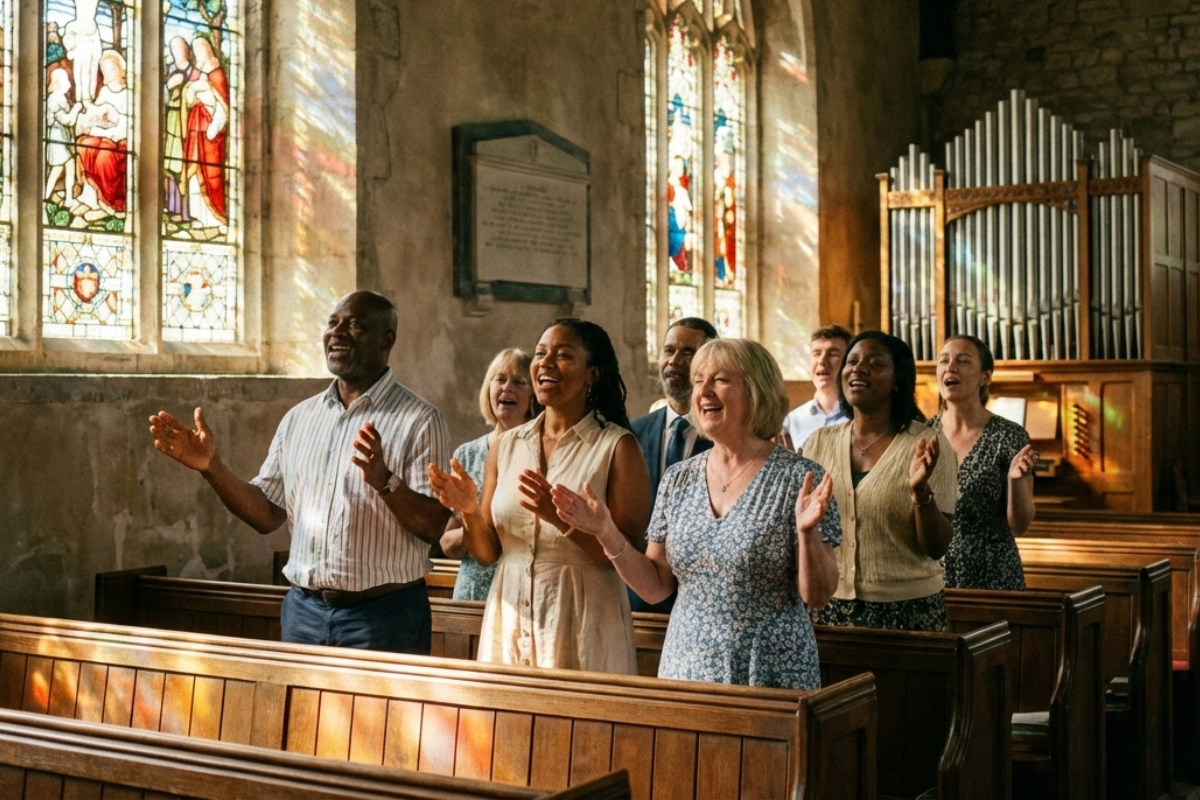The purpose of worship music in church reaches far beyond melodies and harmonies. Worship songs create a space where hearts align with God’s presence. They invite us to reflect, pray, and celebrate our faith together as a congregation. For many believers, these moments of musical worship provide both comfort and motivation to live out their faith each day. Understanding this purpose can deepen both personal devotion and communal connection in ways that words alone cannot express.
Music in worship engages emotions, strengthens focus, and reminds us of God’s promises. It is both a spiritual practice and a form of teaching. By recognizing the unique role of music in church, believers can participate more fully in services and appreciate the depth of communal praise.
Understanding the Purpose of Worship Music in Church
To help you see its impact, let’s look at some key points about the purpose of worship music in church:
- It fosters a personal connection with God through reflection and prayer.
- It builds unity and fellowship among congregants, encouraging shared faith.
- It teaches biblical truths and reinforces lessons from Scripture.
- It sets the tone for reverence and worship within the service.
These points will guide us as we explore how worship music shapes both individual faith and the life of the church community.
The Spiritual Significance of Worship Music in Church
Worship music has a profound spiritual effect. It draws hearts and minds closer to God and helps believers focus on Him during services. By setting an intentional atmosphere, music guides congregants into reflection, prayer, and praise.
Drawing Near to God Through Music
Music can act as a spiritual guide. Just as Christian fasting practices help believers concentrate on God’s presence, worship music creates a sacred space for prayer and meditation. The melodies and lyrics engage emotions, making worship a full-hearted experience. Through music, our spirits find a language that complements prayer and Scripture.
Strengthening Faith in the Congregation
The purpose of worship music in church extends beyond personal devotion. Singing together fosters unity, reminding everyone that they belong to a faith community. Hymns and contemporary songs alike reinforce shared beliefs and values. In these moments, the congregation experiences a collective devotion that encourages spiritual growth and mutual support.
Worship Music as an Expression of Belief
Worship songs serve as a powerful medium for expressing the core truths of Christianity. They allow believers to convey gratitude, confess faith, and meditate on God’s promises in ways that words alone often cannot. Through music, abstract theological ideas become tangible experiences, touching hearts and minds in emotional and spiritual ways. Singing familiar hymns or contemporary praise songs can evoke memories of God’s faithfulness, encourage reflection, and even provide comfort during difficult times.
Teaching Scripture Through Songs
Many worship songs draw directly from the Bible, helping to reinforce its lessons memorably and engagingly. Integrating daily spiritual armor into life can become more natural when music regularly recalls these messages. For instance, songs about God’s protection, provision, or love can remind believers of Scripture even outside of church services. Music acts as a gentle guide, helping people internalize biblical truths and apply them practically in their daily lives. By connecting melody with message, worship songs make Scripture not just understandable but also deeply experiential.
Encouraging Lifelong Spiritual Growth
Regular engagement in musical worship fosters spiritual growth over time. Reflecting on song lyrics can reinforce lessons about patience, trust, humility, and God’s enduring love. Worship music also encourages believers to cultivate consistent prayer and devotion. Understanding the purpose of worship music in church motivates a disciplined, prayerful lifestyle while deepening both personal and communal faith. Stories from congregations often illustrate this: a believer may find encouragement from a hymn during a challenging week, or a family may bond more closely by singing together during Sabbath worship. Music thus becomes a steady companion in the journey of faith, helping believers grow spiritually, emotionally, and communally.
Practical Benefits of Worship Music in Church
Beyond its spiritual significance, worship music has many practical effects that enhance the overall church experience. It sets a tone of reverence, creates an environment conducive to reflection and prayer, and helps people feel emotionally engaged and attentive during services. Music also provides a rhythm to worship, guiding the flow of the service and helping congregants participate more fully. By understanding these practical benefits, believers can approach worship with greater intention and appreciation.
Creating an Atmosphere of Reverence
The arrangement, rhythm, and lyrics of worship songs play a vital role in establishing a sacred atmosphere. Gentle melodies can calm restless minds, while uplifting harmonies inspire joy and gratitude. Music prepares hearts to listen to sermons, meditate on Scripture, and participate fully in communion or prayer time. Worship songs help congregants transition from daily distractions into moments of meaningful devotion, creating space for reflection and connection with God. Even a simple hymn can set the tone for a service, inviting worshippers to focus on God rather than the busyness of life.
Strengthening Community and Fellowship
Singing together unites the church family uniquely and powerfully. Participating in worship music collectively enhances the experience of observing Sabbath rest, making it feel deeper and more meaningful. Music becomes a shared expression of faith, fostering fellowship and reinforcing bonds among members. It encourages congregants to celebrate together, pray together, and support one another spiritually.
In these moments, worship is both personal and communal, reflecting God’s design for His people to live in harmony and encouraging a sense of belonging within the church family. The shared experience of music reminds everyone that each voice contributes to the beauty of collective praise.
The Broader Understanding of Worship Music
Exploring worship music from a wider perspective highlights its historical and global significance. Across the world, different cultures and Christian denominations bring unique styles, instruments, and melodies to worship. These variations not only enrich the worship experience but also reflect the creativity and diversity of God’s people. By looking beyond our own church traditions, we gain a deeper appreciation for how music connects believers across time and place.
Historical and Global Perspectives
The traditions of worship music are incredibly diverse. Early churches relied heavily on hymns and psalms, often sung a cappella or with simple instruments. As Christianity spread, music evolved to reflect local languages, rhythms, and cultural influences. In Africa, drums and vibrant call-and-response singing bring congregations together in energetic worship. In Latin America, lively percussion and harmonized voices create a joyful and immersive experience. Even within Western churches, the shift from classical hymns to contemporary praise songs shows how worship music adapts to the needs of each generation.
Music has always played a central role in teaching and reinforcing biblical truths. Hymns were often written to help believers memorize Scripture or understand theological concepts. Today, worship songs continue this tradition, helping both new and seasoned believers connect emotionally and spiritually with God’s Word. For a more detailed look at the history and forms of Christian worship music, visit this trusted resource to understand how music continues to inspire believers worldwide. Recognizing these origins helps congregations appreciate the depth and beauty of worship across time and place, encouraging a richer and more intentional participation in musical praise.
Embracing the Purpose of Worship Music in Church
The purpose of worship music in church is multifaceted. It nurtures personal devotion, strengthens communal bonds, and communicates God’s truth through song. Worship music transforms services into meaningful encounters with God, inviting both reflection and joyful celebration.
By understanding its spiritual, communal, and practical roles, believers can participate more fully in worship. Songs that teach, inspire, and unite help everyone experience faith in a deeper, more tangible way. Whether singing alone in reflection or together in the congregation, worship music remains a vital thread in the fabric of church life.





